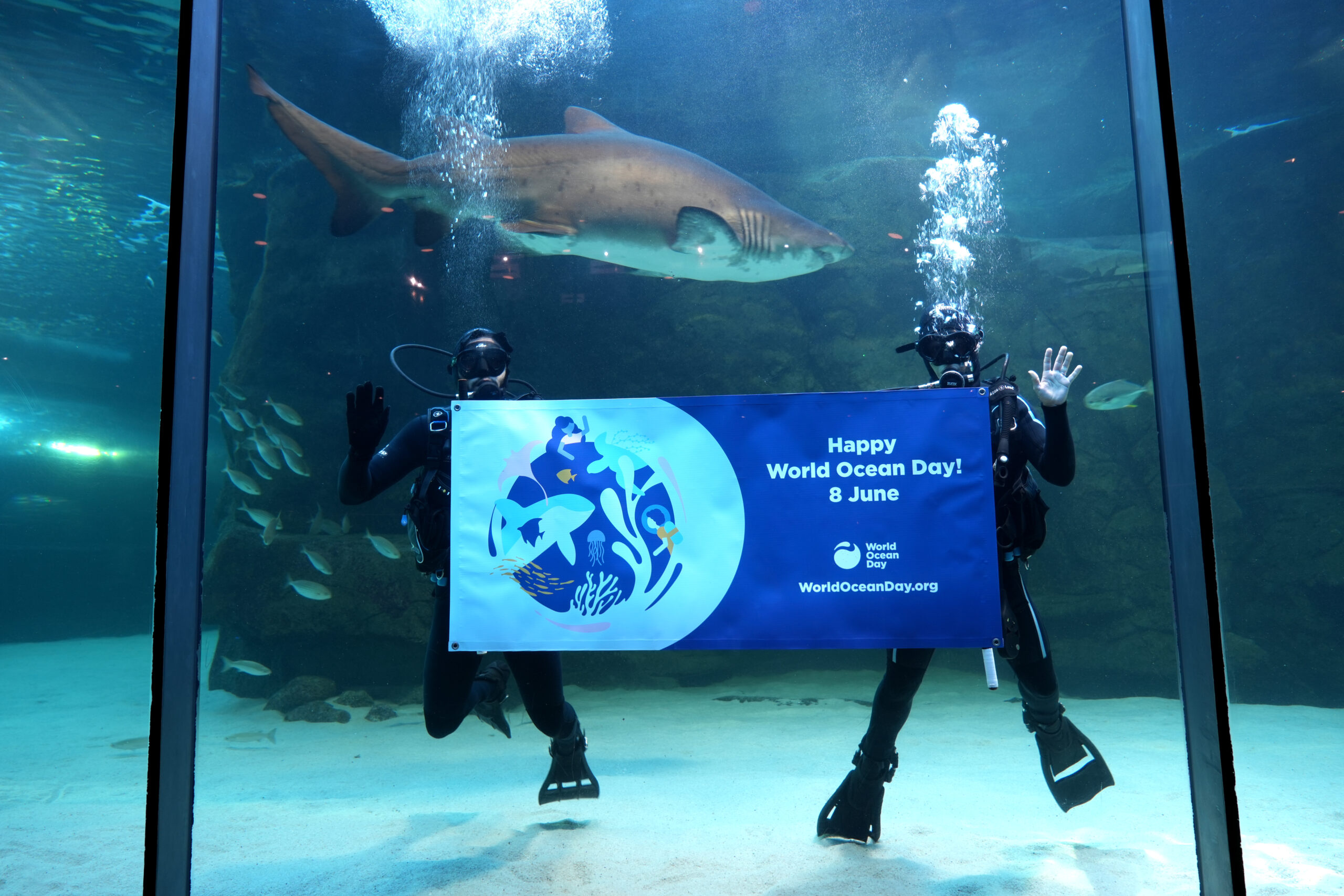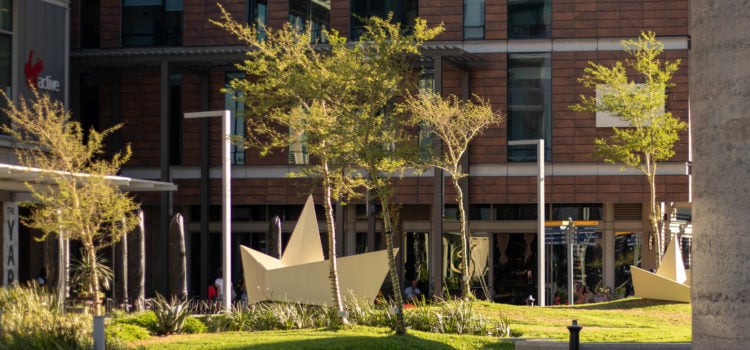
The Two Oceans Aquarium joins organisations around the world in celebration of World Ocean Day on 8 June 2022.
The focus for World Ocean Day 2022 is on protecting 30% of the planet by 2030. People across the globe are urged to add their voices to the growing demand for more protection of the planet as climate change, biodiversity loss, habitat destruction, and overexploitation threaten the diverse ecosystems on which humans depend for their survival.
The “30×30” movement has already resulted in more than 90 countries committing to protect at least 30% of their land and ocean by 2030. South Africans are urged to join the #30X30NOW campaign and sign the online petition which calls for the South African government to support this global goal.
South Africa currently protects almost 8% of its terrestrial area and just over 5% of the ocean and its coast through 41 marine protected areas (MPAs). In the same way that nature and game reserves protect the terrestrial plants and animals, MPAs serve to protect the ocean’s inhabitants, several which are threatened with extinction. MPAs play a significant role in the protection of spawning and nursery areas that allow for fish species to recover from overfishing. They also provide safe havens for marine life to thrive, maturing into adulthood.
Some of the other benefits of these valuable ocean areas include:
- Providing a home to rare and endangered species thereby ensuring marine biodiversity
- Allowing fish populations to increase in size and abundance, supporting adjacent fisheries
- Protecting cultural heritage connected to the ocean
- Providing beautiful spaces for recreational activities, thereby promoting tourism
- Providing educational centres for environmental learning
- Providing a solid foundation for researching the natural world
- Absorbing enormous amounts of carbon dioxide helping to create a buffer against climate change
- Creating a marine wildlife economy for sustainable job creation.
An example of a fish species benefitting from MPAs is the seventy-four (Polysteganus undulosus). Seventy-four sea breams were overfished in the 1960s to the brink of extinction. The fishery was closed in 1988 to protect this species. The Aliwal Shoal Marine Protected Area off the south coast of Kwa-Zulu Natal protects the breeding grounds of seventy-four. There is some evidence of juveniles increasing although the numbers of adult seventy-fours are still very low. Seventy-four, which are fully protected and on the WWF-SASSI Red List, can be seen in the Two Oceans Aquarium.
Stranded and injured sea turtles, which are rescued, rehabilitated, and released by the Two Oceans Aquarium Education Foundation, are other animals which benefit from MPAs. Loggerhead and leatherback sea turtles nest in the iSimangaliso MPA on the north coast of Kwa-Zulu Natal. These and other species, such as green sea turtles, will travel through various coastal and offshore MPAs throughout their lives, feeding and mating.
The Two Oceans Aquarium is part of the MPA Day Alliance which launched the inaugural MPA Day on 1 August last year. This year, to stimulate public awareness and understanding of MPAs, the Alliance is planning a series of activities including an essay and art competition for children, a photo competition, a special webinar with five leading South African marine scientists, a Twitterchat, and the launch of a citizen science initiative. More information is available on https://www.marineprotectedareas.org.za/.
While every day is an ocean day at the Two Oceans Aquarium, World Ocean Day is of particular importance in that it is a day on which the ocean receives global attention in the form of events, increased media attention, and increased public awareness. Besides supporting the #30X30NOW campaign and learning more about MPAs, individuals can take action in their daily lives to help protect the ocean. Some of these actions include:
- Make sustainable seafood choices – If you must eat seafood, be sure to check the WWF SASSI list to ensure you are picking a green-listed option. Or look for the Marine Stewardship Council logo on seafood packaging.
- Support meat-free Mondays – Enormous amounts of toxic agricultural runoff, overfishing for meal, and negative climate impacts are directly attributed to the meat industry. Reducing meat, egg and dairy consumption, whether you choose to go vegan or simply eat less, but better-quality meat meals, is one of the most effective ways you can help the ocean.
- Check your car’s tyre pressure – Under-inflated car tyres wear out more quickly and shed more microplastics. They also increase your fuel consumption and carbon emissions. Properly inflated tyres are an easy way to slightly reduce the impact of your commute, if no alternative is available.
- Learn about the ocean – “Out of sight, out of mind”. The ocean is regarded as a dumping ground, and fish are regarded as an infinite resource because most people are not aware of what happens beneath the surface. Learning about, and appreciating the ocean, is the best way to keep this critical part of our natural heritage top of mind.
- Ask your local representatives about their ocean politics – Laws and policy changes are necessary for the long-term protection of our ocean. If the ocean is not an issue that matters enough to you to influence your political voice, it’s not going to matter enough for a politician to lobby to save it.
“Everything on the planet is connected through ecosystems, food chains and the intricate balance of life. To ensure a healthy ocean, with abundant life and a stable climate, it is critical that all elements – land, water, and ocean, are protected,” says Helen Lockhart, Conservation & Sustainability Manager for the Two Oceans Aquarium. “The Two Oceans Aquarium calls on everyone to do their part in protecting the ocean – not just on World Ocean Day, but every day! The first step is to educate and inform yourself about the ocean and about the animals and plants which call the ocean home. The Aquarium offers so many opportunities to discover what the ocean is all about – through exhibits, education courses, campaigns, school group visits, and more. As Sylvia Earle said, ‘Knowing is the key to caring, and with caring there is hope that people will be motivated to take positive actions. They might not care even if they know, but they can’t care if they are unaware’.”
World Ocean Day is celebrated each year on 8 June. The day was first proposed in 1992 at the Earth Summit in Rio that year. In 2002, The Ocean Project began to globally promote and co-ordinate the day with events taking place across the globe. In 2008, the United Nations General Assembly officially recognised the day.
World Ocean Day aims to rally and unite people globally to protect, conserve and restore the blue heart of the world. The day promotes collaborative action through its global network of youth and organisational leaders in more than 140 countries. The collaboration provides free resources to enable organisations to take part in the celebrations of this day and to raise awareness of the ocean that connects us all.



